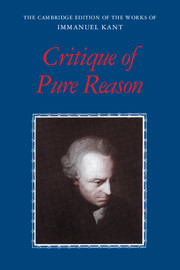Book contents
- Frontmatter
- Contents
- General editors' preface
- Acknowledgments
- Introduction
- Immanuel Kant, Critique of Pure Reason
- I Transcendental doctrine of elements
- Division two. Transcendental dialectic
- II Transcendental doctrine of method
- Chapter I The discipline of pure reason
- Chapter II The canon of pure reason
- Chapter III The architectonic of pure reason
- Chapter IV The history of pure reason
- Editorial Notes
- Glossary
- Index
Chapter II - The canon of pure reason
from II - Transcendental doctrine of method
Published online by Cambridge University Press: 05 July 2013
- Frontmatter
- Contents
- General editors' preface
- Acknowledgments
- Introduction
- Immanuel Kant, Critique of Pure Reason
- I Transcendental doctrine of elements
- Division two. Transcendental dialectic
- II Transcendental doctrine of method
- Chapter I The discipline of pure reason
- Chapter II The canon of pure reason
- Chapter III The architectonic of pure reason
- Chapter IV The history of pure reason
- Editorial Notes
- Glossary
- Index
Summary
It is humiliating for human reason that it accomplishes nothing in its pure use, and even requires a discipline to check its extravagances and avoid the deceptions that come from them. But, on the other side, that reason can and must exercise this discipline itself, without allowing anything else to censor it, elevates it and gives it confidence in itself, for the boundaries that it is required to set for its speculative use at the same time limit the sophistical pretensions of every opponent, and thus it can secure against all attacks everything that may still be left to it from its previously exaggerated demands. The greatest and perhaps only utility of all philosophy of pure reason is thus only negative, namely that it does not serve for expansion, as an Organon, but rather, as a discipline, serves for the determination of boundaries, and instead of discovering truth it has only the silent merit of guarding against errors.
Nevertheless, there must somewhere be a source of positive cognitions that belong in the domain of pure reason, and that perhaps give occasion for errors only through misunderstanding, but that in fact constitute the goal of the strenuous effort of reason. For to what cause should the unquenchable desire to find a firm footing beyond all bounds of experience otherwise be ascribed? Pure reason has a presentiment of objects of great interest to it. It takes the path of mere speculation in order to come closer to these; but they flee before it. Presumably it may hope for better luck on the only path that still remains to it, namely that of its practical use.
- Type
- Chapter
- Information
- Critique of Pure Reason , pp. 672 - 690Publisher: Cambridge University PressPrint publication year: 1998
- 1
- Cited by



